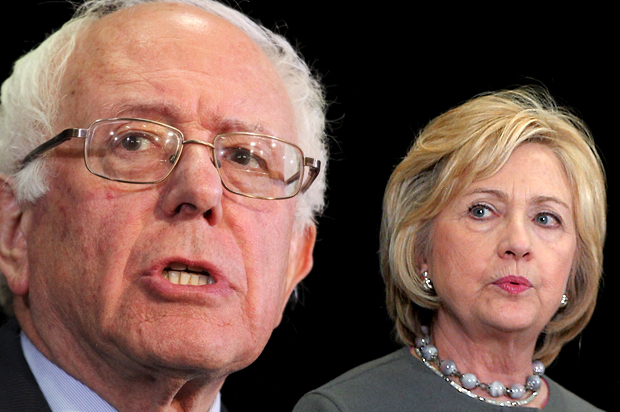Throughout this Democratic primary season, Hillary Clinton has repeatedly cast herself as “a progressive who likes to get things done,” and her opponent, Bernie Sanders, as a foolish idealist whose ideas “sound good on paper but will never make it in the real world.”
“I want you to understand, I will not promise you something I cannot deliver,” she told a South Carolina crowd last Friday. “I will not make promises I know I cannot keep.”
But, contrary to these assurances of realism and pragmatism, Clinton has actually set forth a bold, sweeping agenda to transform America.
Her campaign website pledges that “Hillary will overturn Citizens United; end secret, unaccountable money in politics; end the era of mass incarceration; enact comprehensive immigration reform; make high-quality education available to every child; raise the minimum wage; [and] tackle dangerous risks in the big banks.”
Such intrepid ideas have little chance of passage in a United States Congress controlled by Republican lawmakers who are still trying to repeal President Obama’s Affordable Care Act, in an election year with narrow chances for a Democratic re-takeover of the Senate, and even less for the House.
This is a critique often leveled at Sanders, but it’s true of Clinton, as well.
So what’s the answer to this glaring roadblock?
The Vermont senator’s response is now familiar to many: a call for “a political revolution where millions of people stand up and say loudly and clearly that our government belongs to all of us.”
But what’s Clinton’s?
At last Thursday’s Democratic debate in Milwaukee, voters got a hint about the former secretary of state’s method of change.
“I believe I can get the money that I need by taxing the wealthy, by closing loopholes, the things that we are way overdue for doing,” she said. “And I think once I’m in the White House, we will have enough political capital to be able to do that.”
This idea of “political capital” is one of the few times Clinton has spoken about how she proposes to bring her campaign promises to lawful life.
It’s not very convincing.
President Obama’s efforts at bipartisan compromise have been continually blocked by Republican obstructionism, on everything from gun control to debt reduction to healthcare for veterans.
The president himself has voiced his frustrations with the GOP, saying in 2014 that “[the Republicans’] willingness to say no to everything — the fact that, since 2007, they have filibustered about 500 pieces of legislation that would help the middle class, just gives you a sense of how opposed they are to any progress.”
Clinton often pitches the notion that she is the logical heir to President Obama’s legacy, but, on this matter, she might have more in common with him than she’d like.
The Obama administration has been unable to push gun reform, immigration reform, police reform, or pro-labor trade agreements, among other issues, through Congress.
In fact, according to PolitiFact, Obama has broken a whopping 117 campaign promises — not exactly the “get things done” presidency Clinton is running on.
And yet, the former secretary of state is proposing no contrasting strategy to break through Congress, but campaigning in the shadow of a commander-in-chief who, again and again, did not deliver on his election season pledges, all the while claiming she “will not make promises I know I cannot keep.”
It’s nothing short of absurd, or, as the Atlantic writes, ”a strangely naïve and fatalistic misjudging of political culture and dynamics.”
As proven by Obama’s two-term administration, the president of the United States actually has very little political power, and cannot bring forth the sort of sweeping reforms that Clinton promises.
At least, not alone.
When Franklin D. Roosevelt successfully propelled his New Deal through Congress, he did so not because of his “political capital” as an individual president, but because “the public demanded immediate action… and [because] the Republicans had been soundly repudiated at the polls.”
This is the case in every transformative period in America’s history: women gaining the right to vote in 1920; the civil rights movement and the passage of the Civil Rights Act in 1964; the battle for Native rights and the passage of the Indian Civil Rights Act in 1968; the gay rights movement and the 2015 Supreme Court ruling —every one of these laws and court rulings were brought about by tens of thousands of people voting, protesting, marching, holding sit-ins, rallying in Washington, D.C., and, sometimes, being beaten, bloodied and even murdered.
History shows us that change does not come from within the choked bureaucracy of Washington; it comes from the will of the people.
Repeatedly, Clinton has demonstrated she does not understand this, nor does she understand the Sanders campaign.
In January, the former secretary of state said, “I wish that we could elect a Democratic president who could wave a magic wand and say, ‘We shall do this, and we shall do that.’ That ain’t the real world we’re living in.”
Sanders has never proposed to “wave a magic wand,” but asked the people of the United States to create a grass-roots movement in the vein of the ‘30s and the ’60s that will force Congress to respond, or that will elect candidates into office who will.
There is a reason Sanders says “we/us,” and Clinton says “I/me”: The Sanders campaign is about a revolution, and the Clinton campaign is about the election of a president.
You can take issue with the plausibility of this movement, but one thing is for certain: It has happened before in this country, and it is, by and large, the only way transformative change has ever come to pass.

